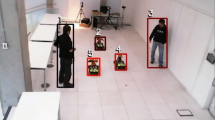Abstract
This paper presents a software architecture for the control of parallel kinematic machines. A generic approach for the integration of self-management capabilities is introduced and detailed with the example of a management component for the dynamic distribution of tasks. The goal is to optimize the load balance of the distributed control system while minimizing bus communication. Depending on monitored information, possible system adaptations are calculated, which are verified regarding their conformance to real-time requirements before they are stored in a data base. A combination of graph partitioning heuristics is used to determine nearly optimal control task to CPU mappings.
Access this chapter
Tax calculation will be finalised at checkout
Purchases are for personal use only
Preview
Unable to display preview. Download preview PDF.
Similar content being viewed by others
References
Kephart, J.O., Chess, D.M.: The Vision of Autonomic Computing. Computer 36(1), 41–50 (2003)
Wolf, T.D., Holvoet, T.: A Taxonomy for Self-* Properties in Decentralised Autonomic Computing. In: Autonomic Computing: Concepts, Infrastructure, and Applications, Taylor & Francis, CRC Press (2006)
Branke, J., Mnif, M., Müller-Schloer, C., Prothmann, H., Richter, U., Rochner, F., Schmeck, H.: Organic computing – addressing complexity by controlled self-organization. In: Proceedings of the 2nd International Symposium on Leveraging Applications of Formal Methods, Verification and Validation, ISoLA 2006 (2006)
Frank, U., Giese, H., Müller, T., Oberthür, S., Romaus, C., Tichy, M., Vöcking, H.: Potenziale und Risiken der Selbstoptimierung für die Verlässlichkeit mechatronischer Systeme. In: 5. Paderborner Workshop Entwurf mechatronischer Systeme. HNI Verlagsschriftenreihe, Paderborn, vol. 210 (2007)
Merlet, J.-P.: Parallel Robots. Kluwer Academic Publishers, Dordrecht (2000)
Storey, N.: Safety-Critical Computer Systems. Pearson, London (1996)
Kohn, N., Varchmin, J.-U., Steiner, J., Goltz, U.: Universal communication architecture for high-dynamic robot systems using qnx. In: Proceedings of International Conference on Control, Automation, Robotics and Vision (ICARCV 8th), vol. 1, pp. 205–210. IEEE Computer Society, Kunming (2004)
Dadji, Y., Michalik, H., Kohn, N., Steiner, J., Beckmann, G., Möglich, T., Varchmin, J.U.: A Communication Architecture for Distributed Real-Time Robot Control. In: Schütz, D., Wahl, F.M. (eds.) Robotic Systems for Handling and Assembly. STAR, vol. 67, pp. 213–231. Springer, Heidelberg (2010)
Finkemeyer, B.: Robotersteuerungsarchitektur auf der Basis von Aktionsprimitiven. Ph.D. thesis, Technische Universität Carolo-Wilhelmina zu Braunschweig (2004)
Finkemeyer, B., Kröger, T., Wahl, F.M.: A Middleware for High-Speed Distributed Real-Time Robotic Applications. In: Schütz, D., Wahl, F.M. (eds.) Robotic Systems for Handling and Assembly. STAR, vol. 67, pp. 193–212. Springer, Heidelberg (2010)
Maaß, J., Kohn, N., Hesselbach, J.: Open modular robot control architecture for assembly using the task frame formalism. International Journal of Advanced Robotic Systems 3(1), 1–10 (2006)
Keimer, R., Sinapius, M.: Adaptive components for parallel robots. In: Schütz, D., Raatz, A., Wahl, F.M. (eds.) Proceedings of 3rd International Colloquium of the Collaborative Research Center 562. Fortschritte in der Robotik, vol. 14, pp. 181–190. Shaker Verlag, Aachen (2008)
Thomas, U., Wahl, F.M.: Sensor guided execution of robot tasks based on skill primitives. In: Robotic 2002, pp. 71–77 (2002)
Thomas, U., Maaß, J., Hesselbach, J., Wahl, F.M.: Towards a new concept of robot programming in high speed assembly applications. In: Proceedings of IEEE/RSJ International Conference on Intelligent Robots and Systems IROS 2005, pp. 3932–3938 (2005)
Maaß, J.: Ein Beitrag zur Steuerungstechnik für parallelkinematische Roboter in der Montage. Ph.D. thesis, Technische Universität Carolo-Wilhelmina zu Braunschweig (2009)
Kolbus, M., Reisinger, T., Maaß, J.: Robot Control based on Skill Primitives. In: Robotics and Applications: Sixth IASTED International Conference Proceedings (2005)
Kröger, T., Finkemeyer, B., Wahl, F.M.: Manipulation Primitives: A Universal Interface Between Sensor-Based Motion Control and Robot Programming. In: Schütz, D., Wahl, F.M. (eds.) Robotic Systems for Handling and Assembly. STAR, vol. 67, pp. 293–313. Springer, Heidelberg (2010)
Bier, C., Maaß, J., Campos, A., Queiroz, E.: Direct singularity avoidance strategy for the hexa parallel robot. In: 18th International Congress of Mechanical Engineering (COBEM 2005), Ouro Preto, Brasilien (2005)
Steiner, J., Hagner, M., Goltz, U.: Runtime analysis and adaptation of a hard real-time robotic control system. Journal of Computers (JCP) 2(10), 18–27 (2007)
Gamma, E., Helm, R., Johnson, R., Vlissides, J.: Design Patterns. Elements of Reusable Object-Oriented Software. Addison-Wesley, Reading (1995)
Steiner, J., Amado, A., Goltz, U., Hagner, M., Huhn, M.: Engineering self-management into a robot control system. In: Proceedings of 3rd International Colloquium of the Collaborative Research Center 562, pp. 113–125 (2008)
Kernighan, B., Lin, S.: An efficient heuristic procedure for partitioning graphs. Bell Systems Technical Journal 49(2), 291–308 (1970)
Henia, R., Hamann, A., Jersak, M., Racu, R., Richter, K., Ernst, R.: System level performance analysis - the symta/s approach. IEEE Proceedings Computers and Digital Techniques 152(2), 148–166 (2005)
Maaß, J., Steiner, J., Amado, A., Hesselbach, J., Huhn, M., Raatz, A.: Self-management in a control architecture for parallel kinematic robots. In: Proceedings of the ASME 2008 International Design Engineering Technical Conferences & Computers and Information in Engineering Conference IDETC/CIE 2008, Brooklyn, New York, USA (2008)
Author information
Authors and Affiliations
Editor information
Editors and Affiliations
Rights and permissions
Copyright information
© 2010 Springer-Verlag Berlin Heidelberg
About this chapter
Cite this chapter
Steiner, J., Goltz, U., Maaß, J. (2010). Self-management within a Software Architecture for Parallel Kinematic Machines. In: Schütz, D., Wahl, F.M. (eds) Robotic Systems for Handling and Assembly. Springer Tracts in Advanced Robotics, vol 67. Springer, Berlin, Heidelberg. https://doi.org/10.1007/978-3-642-16785-0_20
Download citation
DOI: https://doi.org/10.1007/978-3-642-16785-0_20
Publisher Name: Springer, Berlin, Heidelberg
Print ISBN: 978-3-642-16784-3
Online ISBN: 978-3-642-16785-0
eBook Packages: EngineeringEngineering (R0)




